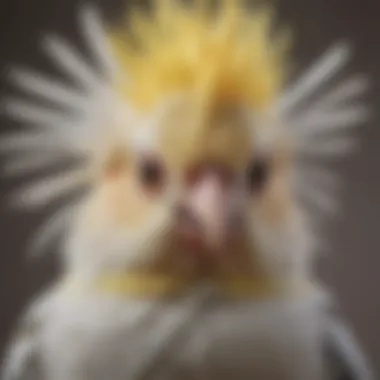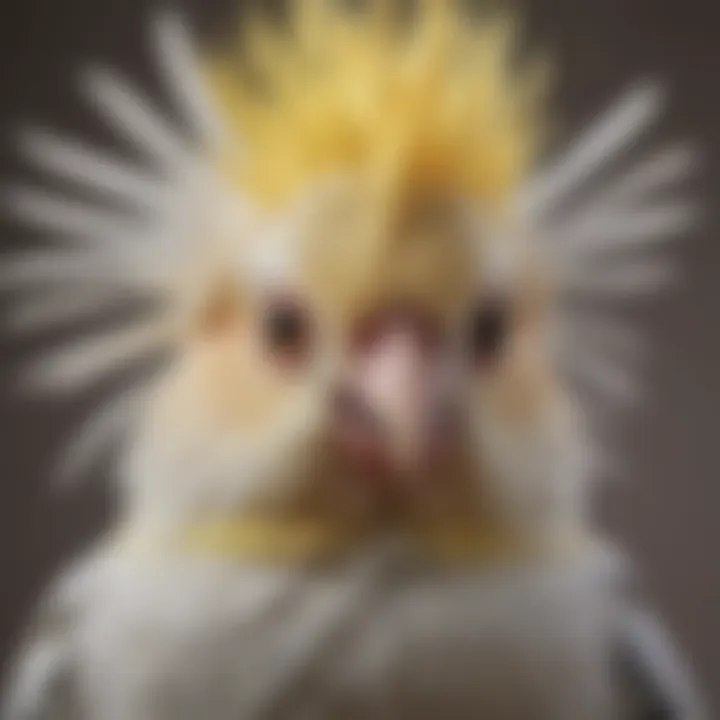Choosing the Perfect Names for Your Pet Birds


Intro
Categories of Names
Choosing a name can sometimes feel overwhelming. Options are nearly limitless: from traditional names to quirky and creative ones. Consider categorizing potential names to streamline the process. Here are a few suggestions:
- Nature-Inspired Names: Reflect the beauty of the environment. Examples include Willow, Sky, and Ocean.
- Cultural Influences: Names originating from different cultures can bring a unique flair. For instance, names like Kiwi (from New Zealand) or Pablo (from Spanish origin).
- Descriptive Names: Names based on looks or behaviors, such as Snowy for a white bird or Chatter for a talkative parakeet.
Practical Considerations
When selecting a name, keep in mind the practicalities behind it. A name that is easy to say and hear will be beneficial in training and communication. Here are useful tips to consider:
- Length of the Name: Shorter names, typically one or two syllables, are easier for birds to recognize.
- Sound of the Name: Names with distinct and clear sounds will capture the bird's attention effectively.
- Uniqueness vs. Commonality: While common names like Polly or Coco are easily recognized, distinctive ones help in setting your bird apart.
Choosing a distinctive and meaningful name can enhance the connection you share with your pet bird.
End
Ultimately, the process of naming a pet bird is more than a task—it is a journey of discovery. By understanding the individuality of each bird and exploring various naming categories, pet owners can make informed decisions. Thoughtful name selection is a crucial step in enhancing the bond between the owner and their feathered companion. In the following sections, we will continue to explore how different aspects of bird care relate to building a fulfilling relationship.
Preamble to Bird Naming
Naming a pet bird is an essential aspect of pet ownership that goes beyond the mere assignment of a label. It reflects the unique relationship between the bird and its owner. Choosing a name becomes a personal expression that embodies the bird's identity while allowing the owner to create a deeper connection. As birds are known for their distinct personalities and behaviors, selecting an appropriate name can enhance the joy of companionship.
There are several factors to consider when naming a pet bird. Many owners may focus on the bird's species, color, or characteristics. However, understanding the significance of individuality is paramount. A name should resonate with the bird's unique traits and social behaviors.
This article will delve into various aspects of bird naming. It will explore different categories of names, such as nature-inspired or cultural names, as well as practical considerations during the naming process. Readers will gain insights into the journey of selecting an ideal name that aligns with their bird's personality. By doing so, the connection between the pet and owner can be strengthened, making the pet's name not just a word, but a symbol of their bond.
Ultimately, the choice of a name serves as a reflection of the owner's affection and commitment to their feathered companion. It is more than a simple act; it holds emotional significance that can affect how the bird perceives its environment and its relationship with its owner. Therefore, investing time and thought into this process is not just beneficial, but necessary.
Significance of a Bird's Name
Choosing a name for a pet bird is a fundamental part of pet ownership. A name often serves as the first point of connection between the owner and their avian companion. Thus, the significance of a bird's name goes beyond mere identification; it encapsulates personality, individuality, and the bond shared between the bird and its owner.
A thoughtfully chosen name can reflect the unique traits of the bird. For instance, if a bird is exceptionally vocal, a name like Chatterbox might be fitting. Alternatively, a quiet and reserved bird might lend itself to a name such as Whisper. This connection to the bird’s characteristics can deepen the owner’s appreciation and understanding of their pet, reinforcing the emotional relationship they share.
"A name can shape perceptions and feelings about the bond between pet and owner."
Moreover, a name can create social dynamics. When introducing a pet bird to family or friends, the name creates an immediate context for understanding the bird's character. The bird's personality often influences how people react to it. For example, a comedic or quirky name may elicit laughter, fostering a more relaxed interaction. Conversely, a more regal name could incite admiration, shaping expectations around the bird’s behavior.
In addition, naming conventions can arise from cultural or historical influences. A name that resonates with a particular heritage can build a sense of heritage and identity. For example, names like Apollo or Cleopatra not only invoke historical figures but also provide a bridge to the owner's interests and values.
Furthermore, choosing a name is an exercise in creativity. Owners may draw from various sources like literature, nature, or even personal experiences. This creative process allows pet owners to invest themselves emotionally in the naming decision. The act of selecting a name can be a fulfilling and joyous moment, adding to the overall experience of pet ownership.
Consideration of the significance of a bird's name entails understanding its impact. It acts as a crucial component in developing a connection, encapsulating the essence of the bird, and forging a unique relationship that will last through the bird’s life. Therefore, it's vital to take time and reflect on the name that suits the avian friend best. By doing so, pet owners build a lasting bond that enhances their shared journey.
Understanding Bird Personalities
Understanding the personalities of pet birds is crucial for choosing the ideal name. Each bird has its own unique traits and quirks that can inform the naming process. Recognizing those characteristics allows owners to select names that resonate with their birds’ individuality. A name reflects a bird's personality, which can strengthen the bond between the pet and its owner.
Bird behavior and personality affect not only the choice of name but also how birds respond to them. For instance, a more sociable bird may respond better to a playful or friendly name, while a shy bird might need a softer or more comforting name to feel secure. By exploring the various aspects of bird behavior, owners can gain valuable insights into how best to honor their pet’s spirit through name selection.
Social Behavior
Birds are highly social creatures, and their behavior significantly contributes to their personality. Social behavior can vary greatly between species and individual birds. For example, some birds, like parakeets, thrive on interaction and often develop strong bonds with their owners. Others, such as certain finches, may prefer solitude or only limited interaction.
When naming a bird, it is helpful to consider its social tendencies. If the bird enjoys interacting with people, a name that embodies playfulness or companionship could suit it best. On the other hand, for a more reserved bird, a gentle name may promote a sense of comfort. Understanding these dynamics allows pet owners to craft names that reflect their bird’s social behavior.


Vocalization Patterns
Vocalization is another fundamental aspect of identifying bird personalities. Each species has distinct vocal patterns that can range from melodious songs to chattering noises. Birds like canaries are known for their singing ability, while cockatiels often mimic sounds and phrases from their environment. Observing a bird’s vocalizations helps in understanding its unique character.
By paying attention to how a bird communicates, owners can choose names that harmonize with these vocal patterns. A bird that sings beautifully might suit a name associated with music or melody. Alternatively, if a bird tends to chatter frequently, a quirky or fun name may align with its vocal character. It is essential that the chosen name complements the unique sounds emitted by the bird.
Activity Levels
Activity levels in birds vary significantly among species and even between individual birds of the same species. Some birds are naturally energetic and love to explore their surroundings, while others are more laid-back and prefer a calm environment. This difference in activity can strongly influence name selection.
For highly active birds, consider names that reflect their playful nature. Think of lively options that capture their zest for motion. Conversely, a quieter bird may benefit from a name that conveys tranquility or gentleness. Observing how a bird engages with its environment can yield important clues as to what name might best suit it.
Types of Pet Birds and Their Characteristics
Understanding the types of pet birds is essential when selecting the right name. Each bird species possesses unique traits and temperaments. These characteristics often guide pet owners in choosing a name that reflects the bird's personality and style. When considering a name, it is beneficial to recognize how a bird's traits can influence owner-bird interactions and overall bonding.
Parakeets
Parakeets, commonly known as budgerigars or “budgies,” are among the most popular pet birds. Their playful nature and sociable behavior make them endearing companions. Parakeets can be highly trainable, exhibiting a range of vocalizations and social habits. Their intelligence suggests names that reflect their personality. Names like “Sunny” or “Sprout” can be fitting, capturing both their color and energy. When naming a parakeet, consider its unique traits, as they often develop distinct personalities.
Canaries
Canaries are known for their delightful songs. These small birds come in a variety of colors, and their vocal abilities can be remarkable. In naming a canary, one might choose a name that highlights its song or color. Consider names like “Melody” for their singing or “Amber” for a yellow canary. Selecting a name that reflects their musical quality adds to the appreciation of their nature. Also, it is important to think about the bird's character, as some canaries may be more reserved while others are more outgoing.
Cockatiels
Cockatiels are renowned for their affectionate nature and charming whistles. These medium-sized birds often bond closely with their owners. When choosing a name for a cockatiel, think about names that reflect their personality. Names like “Chirp” or “Pip” can suit their vocalizations, while names reflecting their distinctive crest, like “Cresty,” may work well. Their social behavior makes them prone to mimicry, thus names that resonate with their playful side can enhance communication and interaction.
Larger Birds like Macaws and Amazons
Larger birds, including macaws and Amazons, have strong personalities and require more interaction. These birds are often very social and exhibit unique vocal skills. Naming larger species necessitates careful thought, as their names will resonate over time. Names like “Rio” or “Zazu” are popular choices that reflect both their playful nature and striking appearances. Understanding the bird’s traits can assist in the naming process, as larger birds often have commanding presences. Choosing a name that suits a bird's grandeur can enhance the relationship between the owner and the bird.
Consider the bird's size and personality when choosing a name, as this can create a strong bond between the owner and the bird.
Categories of Bird Names
Selecting a name for your pet bird goes beyond mere labeling. It defines how you perceive your avian friend and reflects its individuality. Categories of bird names serve as a framework that can help in inspiring thoughtful choices. Names can represent the bird's traits, its environment, or even cultural ties. Understanding these categories allows pet owners to make informed decisions when naming their feathered companions.
Nature-Inspired Names
Nature-inspired names draw influence from elements of the natural world. These names reflect the beauty and diversity found outdoors. They can be derived from flora, geographical features, or wildlife. For instance, a parakeet with vibrant green feathers might suit the name Emerald, inspired by the gemstone or lush green leaves.
Selecting nature-inspired names provides a connection to the world around us. It helps in creating a bond between the owner and the pet bird. These names often evoke feelings of harmony and balance, aligning the bird with its natural instincts.
Cultural and Historical Names
Cultural and historical names can deeply resonate with both the pet owner and the bird. These names may stem from famous figures, historical events, or mythological references. For example, naming a cockatiel Athena could symbolize wisdom, while a larger bird like a macaw might be named Hercules after the strong Roman hero.
By choosing a name with historical significance, one adds depth to the relationship. It serves as a reminder of cultural values or personal beliefs. This category allows pet owners to express their identity and appreciation for history through their bird’s name.
Funny or Playful Names
Injecting humor into the naming process can lighten the atmosphere and bring joy. Funny or playful names often reflect quirks or characteristics of the bird. Names like Pecky for a bird that enjoys pecking at everything, or Sir Flapsalot for a bird that loves to fly, can evoke a smile.
While humor can be subjective, it often helps to create a light-hearted dynamic. These names foster an enjoyable environment and can ease the owner's experience with their pet. Just ensure the humor does not diminish the respect for the bird's individuality.
Names Based on Color or Appearance


Names based on a bird’s color or appearance can be immediately descriptive and easy to remember. Bright colors often inspire vibrant names. For instance, a blue parakeet might be aptly named Sky, while a yellow canary could be called Sunny. These names are intuitive and clearly relate to the bird's visual characteristics.
Such naming can also aid in training. Associating a name with the bird's appearance can help pet owners remember and recall said name during interactions. Ultimately, choosing names based on color can simplify communication and enhance the pet-owner relationship.
Effective naming is a thoughtful process that enhances the bond between you and your bird. Consider your bird's uniqueness while exploring various categories for naming.
Considering these categories of names allows for a more structured approach in choosing the ideal name for your pet bird. By reflecting on their characteristics, nature, or even cultural significance, you can find a name that feels just right.
Finding Inspiration for Names
Finding the right name for a pet bird is not just a task; it is an opportunity to express the pet's unique identity. A name can reflect personality, appearance, or even the owner's interests. Exploring different sources for inspiration can greatly enhance the naming experience. It is beneficial to consider various aspects such as individual preferences, cultural significance, and connections to literature or personal experiences.
Literature and Media
Literature and media play a significant role in shaping naming choices. They provide a vast array of characters and themes that can resonate with pet owners. From classic novels to modern films, many beloved characters possess qualities that can be mirrored in a bird.
For instance, a lively and spirited budgerigar may inspire names like "Pip" from Great Expectations or "Daisy" from The Great Gatsby. Additionally, animated characters like "Tweety" from Looney Tunes can create a fun and playful atmosphere.
When exploring literature, consider:
- Noteworthy characters from books, comics, or poetry.
- Themes or motifs present in various stories that may reflect the bird's nature.
- Authors or literary figures who have influenced your life.
Family and Personal Influences
Family and personal experiences often provide rich material for name selection. Names that hold sentimental value can create a stronger bond between a bird and its owner. Reflecting on family history can uncover names that connect a bird to its owner's lineage.
For example, naming a parakeet after a grandparent or a beloved family friend could add personal significance. Similarly, names can stem from cherished moments, shared experiences, or beloved pets that have come before. This layer of meaning deepens the connection between the bird and its owner.
Consider these factors:
- Names that have sentimental value in your family.
- Experiences shared with pets that inspire names today.
- Personal hobbies or interests that could translate into unique names.
Online Resources and Forums
The internet serves as a vital resource for pet owners seeking inspiration. Websites, forums, and social media platforms provide a wealth of information and ideas. Engaging with these communities can expose owners to creative naming conventions and trends.
Platforms like Reddit and Facebook can facilitate discussions with other bird owners. These spaces often feature suggestions, polls, or even shared experiences that may spark a perfect name for a pet bird. Searching through blogs or specific bird care websites can also yield helpful lists and thematic naming ideas.
When exploring online:
- Participate in forums to share and gather ideas.
- Explore social media hashtags related to pet birds for trending names.
- Read articles and blog posts about bird care and naming tips.
In summary, the avenues for finding inspiration are numerous. Whether through literature, familial ties, or online communities, successful names often emerge from the blend of these influences. This diversified approach not only enriches the naming process but also strengthens the bond between pet and owner.
Practical Considerations in Naming
Choosing the right name for your pet bird is not just a matter of preference. Practical considerations play a crucial role in effective naming. The name you select can influence communication with your bird and impact its behavior. It is essential to choose a name that aligns with your bird's characteristics while being manageable for both you and the bird.
Length and Ease of Pronunciation
When selecting a name, the length and ease of pronunciation are significant factors. Birds often respond better to names that are short, simple, and emphasize certain sounds. Names with one or two syllables can be particularly effective. Avoid names that are overly complicated or contain difficult pronunciations. For example, names like
Case Studies: Famous Pet Bird Names
In the realm of pet bird ownership, the names we select often reflect our aspirations, cultural influences, and a touch of creativity. Exploring famous bird names serves a dual purpose. First, it provides inspiration for pet owners struggling to find the perfect name for their own feathered companions. Second, examining well-documented cases can teach valuable lessons about identity and the psychological aspects tied to a name.
When a bird is given a memorable name, it may elevate the perception of that bird’s personality. Some names evoke a sense of status or uniqueness. These cases highlight the idea that a name can shape how we interact with our pets. Understanding this is crucial for pet owners as it can enhance the bond they share with their birds.


Notable Bird Names in History
Throughout history, certain birds have stood out, not just for their biological significance but also for their names. One exemplary case is that of Charles II’s parrot, which reportedly had a knack for mimicking human speech. This bird was not only a companion but a source of amusement in the royal court. The naming reflected the parrot’s esteemed position in society. Similarly, Polly, a common name for parrots in literature, evokes an image of an intelligent and talkative bird, embodying traits owners might wish to see in their pets.
These historical names also reveal the relationship between birds and humans. A famous bird can personify characteristics that are desirable, prompting owners to choose similar names for their pets. This connection fosters a sense of community among bird owners who admire the legacies of these remarkable creatures.
Pop Culture Bird Names
Modern culture embraces a variety of notable bird names that have captivated audiences through films, television, and literature. The cartoon Tweety Bird is a prime example. Named to reflect its innocent appearance, Tweety has become an iconic figure. This cultural influence permeates social conversations, and names like Tweety are popularly adopted by bird owners today.
Another example is Iago, the parrot from Disney's Aladdin. While the character embodies a more mischievous nature, the name has gained traction among owners seeking a name that suggests playfulness and intelligence.
In pop culture, choosing a name inspired by a well-known character can add a layer of fun for the owner. It can act as a conversation starter and lead to shared experiences among fellow bird enthusiasts.
Bird names from history and pop culture emphasize how names can influence perception. Coupled with understanding one's own bird's personality, these case studies provide a solid foundation for naming decisions, enriching the pet-owner relationship.
Aspects of Name Change
Renaming a pet bird can be a meaningful decision, influenced by the evolving relationship between the bird and the owner. The aspects of name change significantly contribute to the dynamics of this bond. Over time, pet owners might discover that the name they initially chose does not accurately reflect their bird's evolving personality or behavior. This section will discuss when to consider a name change and how to effectively transition to a new name.
When to Consider a Name Change
Some situations indicate it may be time for a new name. One key factor is a change in the bird's behavior. For instance, if a previously shy parakeet becomes more social, a name that reflects its outgoing nature might be appropriate. Other factors include:
- Adoption: If you adopt a bird with an established name that doesn’t suit its personality, a name change is reasonable.
- Mistakes in Initial Naming: Sometimes, names that seem fitting in the beginning become problematic later. If the name conflicts with basic commands, reconsidering it is wise.
- Fresh Start: Birds recovering from a stressful environment might benefit from a new name to symbolize a new beginning.
- Species Changes: If you have given a bird the wrong name based on assumptions about its species or breed, renaming may be necessary for accuracy.
Tips for Transitioning to a New Name
Transitioning to a new name requires careful thought and patience. This process leaves room for the bird to adapt and for the owner to reinforce the new name positively. Here are some strategies:
- Positive Reinforcement: Associate the new name with pleasant experiences. Treats or affection can create a positive link between the name and the bird's experience.
- Use Repeatedly: Consistently use the new name during interactions. The more the bird hears the new name, the more likely it will begin to recognize it.
- Gradual Change: If the old name has been used for a long time, consider a gradual shift. You might use both names together for a while, like “Squawk-Blue” to assist in the bird's adjustment.
- Maintain Consistency: Once the new name is adopted, use it regularly without reverting to the old name. Consistency aids learning and recognition.
- Be Patient: Each bird reacts differently. Some may adjust quickly, while others need time. Patience is key.
Changing a bird's name can refresh its identity and strengthen the bond you share.
Culmination
Choosing the right name for your pet bird is not a trivial matter. The process involves understanding your bird's personality, behavior, and unique traits. A name can reflect its character, enhance your bond, and facilitate better communication between you and your feathered friend.
Through this article, we explored various aspects that influence the naming of birds. For example, we examined cultural influences, the importance of the bird’s characteristics, and how a name can influence both the owner’s perception and the bird’s behavior. Pet birds, being sentient creatures, thrive when their identity is acknowledged. Thus, selecting a name that resonates with their individual personalities is essential.
Moreover, practical considerations such as the length of the name and its ease of pronunciation should not be overlooked. Names that are short and distinct can facilitate quicker recognition and response from your pet. Additionally, avoiding names that sound similar to commands is crucial to preventing confusion.
Ultimately, the name you choose serves as a representation of your relationship with your bird. It embodies your commitment to understanding and caring for them. A thoughtful approach to naming is a step toward fostering a deeper connection, leading to more rewarding interactions.
"A name holds power; it carries an essence, particularly for our pets, who depend on us to understand their individuality."
In summary, take time to consider the options. Assess the various inspirations and practicalities discussed. Personalize this naming journey, and you will not only enhance your bond with your bird but also enrich your experience as a pet owner. This conclusion underlines the multi-dimensional nature of this task. It is not merely a choice, but a reflection of the love and care you invest.
Books on Bird Care and Naming
Books focused on bird care and naming often serve as comprehensive guides. They cover a variety of topics related to pet birds, from their behavior to proper care methods. In particular, they can introduce potential names that are culturally or historically significant. Authors often share personal stories or insights about naming, which can resonate with readers as they search for the perfect name. Some prominent titles include:
- The Bird Care Book by Kenneth W. Stokes
- Names for Pet Birds by Angela W. Beckett
- Birds for Dummies by Gina Spadafori
These books can present different naming approaches. They can discuss the significance of names in various cultures, adding depth to the naming process. Furthermore, they address common questions about bird care, directly linking the well-being of the bird to its name and how it reflects the owner's affection and understanding of their pet.
Online Communities and Support Groups
Online forums and platforms provide an interactive space where pet owners can engage with one another. These communities, such as those found on Reddit and Facebook, offer discussions about everything from preferred naming conventions to personal anecdotes about beloved birds. Engaging in these groups allows owners to share experiences and ask questions in real-time, which can lead to discovering unique names through shared ideas.
- Reddit Groups: Subreddits like r/Birds and r/PetBirds often have threads dedicated to naming suggestions and personal stories.
- Facebook Groups: Various bird ownership groups provide a platform for discussion and sharing photographs, further inspiring name ideas.
Participation in these online spaces fosters a sense of belonging and community. This social interaction can affirm pet owners’ decisions and reinforce the emotional connections they have with their birds, leading to a more fulfilling pet ownership experience.
It’s essential to access multiple resources when selecting a name. Books can provide inspiration and historical context while online communities can offer immediate feedback and personal recommendations.







